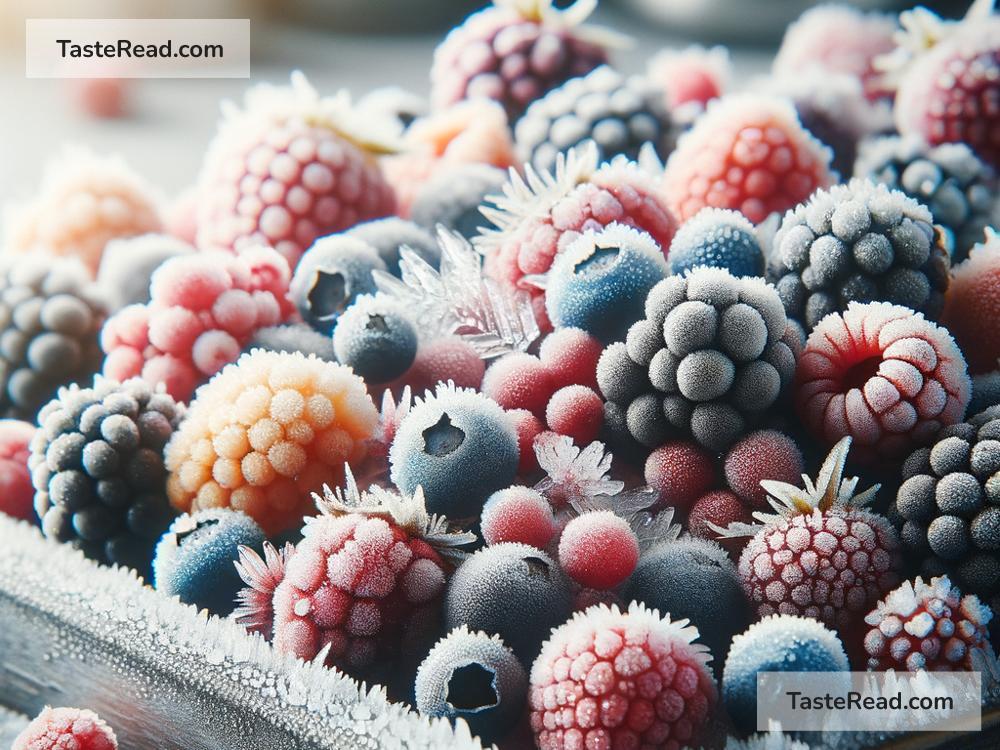How Freezing Preserves the Aroma Compounds in Fruits
We all know that fruits are a gift from nature. They are sweet, juicy, refreshing, and packed with unique aromas that make them special. Just think about the fresh scent of a ripe strawberry or the tangy smell of a juicy mango! These natural smells come from something called aroma compounds. But did you know that freezing fruits can preserve these delightful aromas for longer? Let’s explore how this happens in a straightforward way.
What Are Aroma Compounds in Fruits?
First, let’s understand what aroma compounds are. Aroma compounds are tiny chemical molecules found in food, including fruits, that create their signature scent and flavor. For example, the smell of bananas comes from isoamyl acetate, while limonene gives citrus fruits their fresh, zesty scent.
These aroma compounds are fragile. They can change or disappear when fruits are exposed to heat, air, light, or even time. That’s why freshly picked fruits often smell and taste better than fruits that sit around for a while. Freezing is one way to lock in these aroma compounds for months.
What Happens to Fruits When They Freeze?
When fruits freeze, they are placed in very cold temperatures, usually below 0°C (32°F). This causes the water inside the fruit to turn into ice crystals, which slows down most chemical reactions that lead to spoilage. Freezing doesn’t just pause the physical changes in fruits—it also preserves the delicate aroma compounds that give fruits their characteristic smell.
Why Do Aroma Compounds Need to Be Preserved?
Keeping the aroma compounds intact isn’t just about holding onto the smell of a fruit; it’s also about maintaining its flavor and overall eating experience. If the aroma fades, the taste may also seem bland or less appealing. For instance, frozen strawberries that retain their original aroma will create a much tastier smoothie or dessert than strawberries that lost their scent.
How Freezing Protects Aroma Compounds
Now, let’s understand how freezing actually helps preserve these molecules. There are three main reasons:
1. Slowing Down Chemical Reactions
Most aroma compounds are sensitive and can break down if fruits are exposed to oxygen from the air, light, or heat. These breakdowns happen through chemical processes like oxidation. For example, if a cut apple is left at room temperature, it turns brown and loses some flavor—but this reaction is much slower if the same apple is frozen.
Freezing slows down chemical reactions because very cold temperatures reduce the movement of molecules. With the reactions paused, the fruit’s aroma compounds stay intact for a longer time.
2. Preventing Loss from Evaporation
Another risk to aroma compounds is evaporation. Over time, some aroma molecules can escape from fruits into the air, especially when fruits are warm. For example, think about how strong the smell is when fruits are baked or cooked—that’s because heat causes the aroma compounds to evaporate more quickly.
Freezing fruit prevents evaporation because cold temperatures “lock” the compounds in place. With less movement in the molecules and no heat to trigger evaporation, the aromas stay trapped inside the frozen fruit.
3. Minimizing Microbial Activity
Microorganisms, like bacteria and mold, can grow on fruits and cause spoilage. These microbes can also produce enzymes that break down aroma compounds and diminish the fruit’s natural scent. By freezing fruit, microbial activity is drastically reduced, since these organisms usually can’t survive in freezing temperatures. This helps retain the fruit’s original smell.
Does Freezing Change the Fruit’s Aroma?
Freezing is not perfect; it can sometimes cause slight changes to the fruit’s texture or taste. When fruit freezes, the ice crystals can expand and break the cell walls of the fruit, making the texture a bit softer once thawed. However, this doesn’t mean the aroma itself will disappear. In fact, if the freezing process is done correctly, most aroma compounds are well-preserved.
To keep fruits smelling fresh, it’s important to freeze them quickly after they are harvested. Slow freezing can form large ice crystals, which may cause more damage to the fruit tissues. On the other hand, fast freezing keeps the fruit’s structure intact, helping preserve both texture and aroma.
Tips for Freezing Fruits at Home
If you want to freeze fruits at home while protecting their aroma, here are some simple tips:
-
Choose Fresh Fruits: Start with ripe, fresh fruits to ensure the best aroma. Avoid freezing fruits that are already spoiled or overripe.
-
Wash and Dry: Clean fruits thoroughly and dry them before freezing to avoid freezer burn.
-
Cut and Freeze Quickly: Cut fruits into small pieces and freeze them immediately to reduce exposure to air and light.
-
Use Airtight Packaging: Store fruits in sealed, airtight bags or containers to prevent air exposure.
-
Label and Use Soon: Label your frozen fruits with the date and use them within a few months for the best aroma and flavor.
The Science Behind Your Smoothie
So, the next time you enjoy a delicious smoothie made from frozen fruit, remember the science behind the flavorful experience. Freezing locks in the precious aroma compounds, saving the essence of the fruit for your enjoyment. Thanks to freezing technology, we can savor the taste of summer all year round—whether it’s the juicy sweetness of berries, the tropical tang of pineapple, or the vibrant zing of oranges.
In short, freezing is a powerful tool for preserving the natural fragrances and flavors of fruits. It’s like hitting the pause button on nature’s goodness, ensuring your favorite fruits stay fresh and aromatic until you’re ready to enjoy them.


